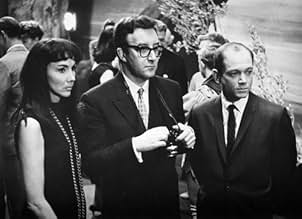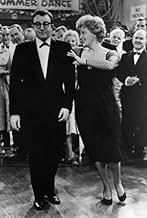Un professore universitario di mezza età si innamora di una giovane quattordicenne, con tragiche conseguenze.Un professore universitario di mezza età si innamora di una giovane quattordicenne, con tragiche conseguenze.Un professore universitario di mezza età si innamora di una giovane quattordicenne, con tragiche conseguenze.
- Candidato a 1 Oscar
- 2 vittorie e 9 candidature totali
Terry Kilburn
- Man
- (as Terence Kilburn)
Trama
Lo sapevi?
- QuizPeter Sellers modeled the voice of his character Clare Quilty on that of his director, Stanley Kubrick.
- BlooperDirector Stanley Kubrick walks out of the very first interior shot (center to right bottom) of Humbert entering Quilty's house.
- Citazioni
Charlotte Haze: Do you believe in God?
Humbert Humbert: The question is does God believe in me?
- Curiosità sui creditiThe credits are played over footage of Lolita's toenails being painted.
- Versioni alternativeThe scene where Lolita first "seduces" Humbert as he lies in the cot is a good 10 seconds longer in the British cut of the film. In the U.S. cut, the shot fades as she whispers the details of the "game" she played with Charlie at camp. In the U.K. print, the shot continues as Humbert mumbles that he's not familiar with the game. She then bends down again to whisper more details. Kubrick then cuts to a closer shot of Lolita's head as she says "Well, allrighty then" and then fades as she begins to descend to Humbert on the cot. The British cut of the film was used for the Region 1 DVD release.
- ConnessioniEdited into Hai-Kubrick (1999)
Recensione in evidenza
This film remains my all-time favorite. It's a delicious, adult meditation on youth, obsession and sex. While not entirely faithful to the novel, it captures the book's spirit and is nonetheless a masterpiece on its own terms. To fully appreciate what Kubrick has done, compare this version to Adrian Lyne's anemic remake.
Kubrick chose his cast wisely for the most part. James Mason conveys both the tormented inner soul and the outwardly polite gentleman with such charm that you simply can't despise him for his treachery. Shelley Winters was never better as the shrill, man-hungry shrew. Sue Lyon is enormously credible in a complex role - physically attractive, childish at times in her behavior, but quietly calculating and manipulative. The weakest link is Peter Sellers, who Kubrick found amusing enough to let him run on too long. Sellers was a brilliant performer, but just not right for this film. As Quilty, he's fine. When masquerading as others, he's mostly intrusive and tends to alter the tone of what's going on.
The need to tread carefully around the censors in 1962 actually works in the film's favor. There's a sophisticated subtlety that counterbalances the lurid subject matter. In fact, I even prefer the edited-for-television version of the scene in which Humbert and Lolita first have sex. Here she merely whispers in his ear before a suggestive fade-out. In the complete version of the film, the scene continues with them discussing a silly game played at summer camp. The less said, the better.
"Lolita" has aged remarkably well. Its topic is relevant today, and the careful craftsmanship that went into this production holds up beautifully. I think it's Kubrick's best film - they tended to get more self-indulgent as time went on. This one's a gem. Not to be overlooked are the aptly provocative title sequence and Nelson Riddle's luscious piano score.
Kubrick chose his cast wisely for the most part. James Mason conveys both the tormented inner soul and the outwardly polite gentleman with such charm that you simply can't despise him for his treachery. Shelley Winters was never better as the shrill, man-hungry shrew. Sue Lyon is enormously credible in a complex role - physically attractive, childish at times in her behavior, but quietly calculating and manipulative. The weakest link is Peter Sellers, who Kubrick found amusing enough to let him run on too long. Sellers was a brilliant performer, but just not right for this film. As Quilty, he's fine. When masquerading as others, he's mostly intrusive and tends to alter the tone of what's going on.
The need to tread carefully around the censors in 1962 actually works in the film's favor. There's a sophisticated subtlety that counterbalances the lurid subject matter. In fact, I even prefer the edited-for-television version of the scene in which Humbert and Lolita first have sex. Here she merely whispers in his ear before a suggestive fade-out. In the complete version of the film, the scene continues with them discussing a silly game played at summer camp. The less said, the better.
"Lolita" has aged remarkably well. Its topic is relevant today, and the careful craftsmanship that went into this production holds up beautifully. I think it's Kubrick's best film - they tended to get more self-indulgent as time went on. This one's a gem. Not to be overlooked are the aptly provocative title sequence and Nelson Riddle's luscious piano score.
I più visti
Accedi per valutare e creare un elenco di titoli salvati per ottenere consigli personalizzati
Dettagli
Botteghino
- Budget
- 2.000.000 USD (previsto)
- Lordo in tutto il mondo
- 7.411 USD
- Tempo di esecuzione2 ore 33 minuti
- Colore
- Proporzioni
- 1.66 : 1
Contribuisci a questa pagina
Suggerisci una modifica o aggiungi i contenuti mancanti

























